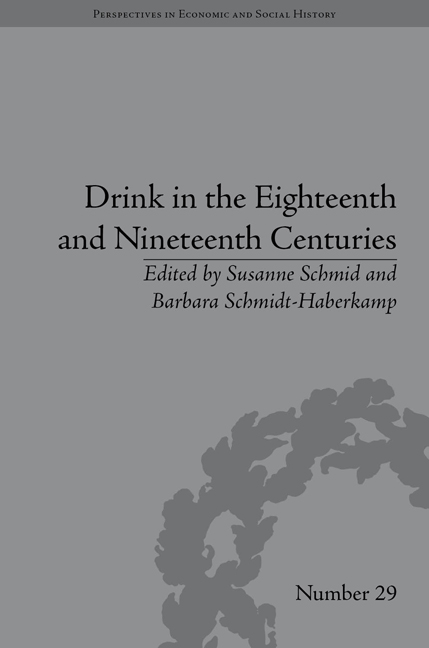Book contents
- Frontmatter
- CONTENTS
- Acknowledgements
- List of Contributors
- List of Figures and Tables
- Introduction
- Part I Ritual and Material Culture
- Part II Institutions and Social Class
- 3 Café or Coffeehouse? Transnational Histories of Coffee and Sociability
- 4 Claret at a Premium: Ned Ward, the True Tory Defender of Fine Wines?
- 5 Eighteenth-Century Travellers and the Country Inn
- 6 Drinking, Fighting and Working-Class Sociability in Nineteenth-Century Britain
- Part III Temperance and the Misery of Alcohol
- Part IV Intoxication and Therapy
- Part V Case Studies: Rum, Cocoa and Magical Potions
- Notes
- Index
5 - Eighteenth-Century Travellers and the Country Inn
from Part II - Institutions and Social Class
- Frontmatter
- CONTENTS
- Acknowledgements
- List of Contributors
- List of Figures and Tables
- Introduction
- Part I Ritual and Material Culture
- Part II Institutions and Social Class
- 3 Café or Coffeehouse? Transnational Histories of Coffee and Sociability
- 4 Claret at a Premium: Ned Ward, the True Tory Defender of Fine Wines?
- 5 Eighteenth-Century Travellers and the Country Inn
- 6 Drinking, Fighting and Working-Class Sociability in Nineteenth-Century Britain
- Part III Temperance and the Misery of Alcohol
- Part IV Intoxication and Therapy
- Part V Case Studies: Rum, Cocoa and Magical Potions
- Notes
- Index
Summary
A man who travels with a family of five persons, must lay his account with a number of mortifications; and some of these I have already happily overcome. Though I was well acquainted with the road to Dover, and made allowances accordingly, I could not help being chagrined at the bad accommodation and impudent imposition to which I was exposed. These I found the more disagreeable, as we were detained a day extraordinary on the road, in consequence of my wife's being indisposed.
I need not tell you this is the worst road in England, with respect to the conveniences of travelling, and must certainly impress foreigners with an unfavourable opinion of the nation in general. The chambers are in general cold and comfortless, the beds paultry, the cookery execrable, the wine poison, the attendance bad, the publicans insolent, and the bills extortion; there is not a drop of tolerable malt liquor to be had from London to Dover.
Tobias Smollett, Travels Through France and Italy (1766)Thus complained the ‘traveller-novelist’ Tobias Smollett, a self-appointed expert on inns, about the accommodation on the road between London and Dover. Implicitly, his complaint describes what a traveller expected to find at an inn: a reasonably warm bed-chamber, a selection of tasty food and alcoholic drinks, a friendly landlord as well as sociable company, and all of this at an acceptable price.
- Type
- Chapter
- Information
- Drink in the Eighteenth and Nineteenth Centuries , pp. 59 - 70Publisher: Pickering & ChattoFirst published in: 2014



